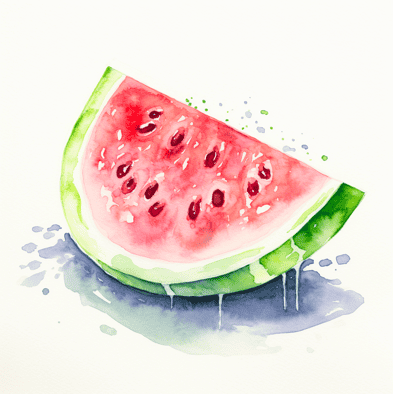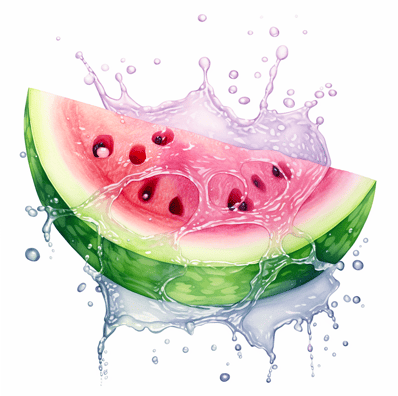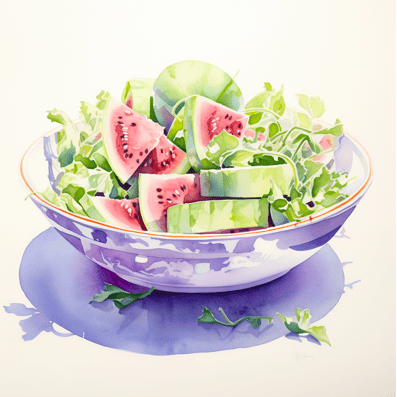
Don’t want to read the whole post?
Watermelon, with its high water content and vitamins like A and C, can be beneficial for skin health, particularly in hydrating and reducing inflammation associated with acne. While it doesn’t directly reduce acne-causing bacteria, its nutrients can play a protective role in skin care, making it a potentially helpful addition to a diet for those with acne-prone skin.
ABOUT ME
Be beauty. Be plant-based!
As a former Registered Nurse and avid plant-muncher, I’m in love with how simple plant-based foods make it easy to be beautiful.

You’ll also love:
Eating More to Weigh Less: Fruitful Freedom
In our quest for clear and vibrant skin, we often find ourselves asking, “Is watermelon good for acne?” This juicy, sweet fruit, adored by many, isn’t just a refreshing snack on a hot day, but might also be a hidden gem in our skincare arsenal. Today, we dive into the world of watermelon and its potential effects on skin health, particularly for those battling acne.
Watermelon: Good or Bad for Acne?
When it comes to understanding the relationship between watermelon consumption and acne breakouts, the scientific community offers mixed insights.
One study exploring the impact of various foods, including cheese, peanuts, and fruits like watermelon, found no direct link between increased consumption of watermelon and changes in acne severity. This suggests that watermelon isn’t bad for acne. However it does’t tell us if watermelon is actually good for acne.

Another study showed that two specific nutrients in watermelon were able to reduced the inflammation associated with acne. Unfortunately they weren’t able to reduce the growth of acne-causing bacteria. Still, this inflammatory effect is crucial, as acne is not just about bacteria but also about how our skin reacts to them.
Finally, a comprehensive review of studies conducted between 2009 and 2020 shows us the bigger picture. This review, encompassing a wide range of research on diet and acne, concluded that fruits, in general, play a protective role against acne. While watermelon was not singled out in this review, the overall implication for fruit consumption is positive in the context of acne management.
Can watermelon help acne scars?
Watermelon may have benefits for acne scars. It is rich in Vitamin C, which promotes skin healing and collagen production, and is also very hydrating. These properties can aid in healing the skin and potentially reducing the appearance of acne scars.

Additionally, watermelon’s high Vitamin C content helps slow down the growth of acne-causing bacteria and its anti-inflammatory properties can reduce redness and inflammation, which are beneficial for treating acne.
However, while watermelon can support skin health, it’s important to remember that its effects can vary from person to person, and it may not be a definitive cure for acne scars. A balanced diet with a variety of skin-friendly foods, including those rich in vitamins A, E, C, zinc, and iron, is recommended for promoting healing and reducing the appearance of scars
Watermelon for Different Skin Types
Watermelon’s potential in skincare extends beyond just those with acne-prone skin. For sensitive skin types, the natural soothing properties of watermelon can be a relief. Its anti-inflammatory benefits help in reducing redness and irritation often associated with sensitive skin.
In contrast, those with oily skin might find watermelon particularly beneficial. The common myth that watermelon might clog pores or worsen oily skin conditions is not backed by scientific evidence. In fact, watermelon’s ability to hydrate and provide essential nutrients without adding excess oil can help in balancing oily skin. This balance is crucial in preventing the overproduction of oil, which is often a precursor to acne.
You’ll also love:
Radiant Skin, Naturally: 5 Plant-Based Foods for Beautiful Skin
Extra Skin Benefits of Watermelon
Hydration and Oily Skin

One of the most celebrated traits of watermelon is its high water content. This is not just great for quenching thirst but also plays a vital role in skin hydration. For individuals with oily skin, hydration is key.
Contrary to popular belief, oily skin needs hydration to maintain balance. Dehydrated skin can lead to an overproduction of oil, exacerbating acne issues. Watermelon, with its refreshing properties, helps in maintaining this delicate balance, providing hydration without adding excess oil to acne-prone skin.
Vitamin Rich
Beyond hydration, watermelon is a treasure trove of vitamins, particularly Vitamin A and Vitamin C. These vitamins are crucial for skin health. Vitamin A, known for its skin repair capabilities, aids in maintaining and repairing skin cells. This is essential for those seeking a smoother complexion and a reduction in acne scars.
On the other hand, Vitamin C is a powerful antioxidant. It fights against free radical damage, which can accelerate ageing and exacerbate skin issues. The presence of these vitamins in watermelon makes it not just a tasty treat but also a beneficial one for your skin.
Antioxidants and Anti-inflammatory Properties
The battle against acne is often a fight against inflammation. Here, the antioxidant properties of watermelon come into play. These antioxidants help reduce skin irritation and inflammation, common culprits in acne flare-ups. By incorporating watermelon into your diet or skincare routine, you may be able to soothe inflamed skin and reduce acne severity.
Avoiding Premature Ageing
Watermelon isn’t just about hydration; it’s packed with components that benefit the skin in various ways. The lycopene content, for example, is a powerful antioxidant that helps protect the skin from environmental stressors. This can be particularly beneficial in managing the appearance of fine lines and promoting skin elasticity.

Furthermore, the amino acids and fatty acids present in watermelon contribute to skin health by reinforcing the skin barrier and improving texture (i.e. softer and smoother skin!).
Watermelon’s rich nutritional profile also means it can aid in combating oxidative stress, which is also linked to premature ageing. Its components, like Vitamin E and nitric oxide, play a role in wound healing and maintaining healthy skin.
The presence of linoleic acid in watermelon aids in the collagen production, crucial for reducing age spots and revitalising dull skin. The myriad of watermelon benefits makes it a versatile and potent ingredient in skincare, addressing issues from dead skin cells to dark spots.
Topical Use of Watermelon in Skincare
The benefits of watermelon extend beyond eating; it can also be a valuable addition to your topical skincare regimen. For a start, simple applications like using fresh cold watermelon juice with a soft cotton ball can provide a refreshing and hydrating experience for the skin. This can be particularly soothing for inflamed or irritated areas, offering a gentle way to nurture your skin.
DIY Watermelon Skincare Recipes
Crafting your own watermelon-based skincare solutions can be both fun and effective. For instance, a basic face mask can be made by blending watermelon pulp into a smooth paste. Applying this directly to the skin can harness the fruit’s hydrating and soothing properties.
Watermelon in Beauty Products

The skincare industry has rapidly embraced watermelon for its myriad benefits, leading to an increase in products infused with watermelon extract and watermelon seed oil. These natural ingredients are gaining popularity in moisturisers, serums, and face masks, praised for their hydrating and nutrient-rich properties. What makes watermelon seed oil especially sought-after is its lightweight texture and ability to moisturise without clogging pores, making it an excellent choice for various skin types.
Another key component found in watermelon is malic acid, a natural exfoliator. This acid gently removes dead skin cells, promoting a smoother, more radiant complexion. Its inclusion in skincare products enhances their ability to brighten and even out skin tone, contributing to a healthier-looking skin.
Moreover, watermelon-based natural exfoliators and watermelon face packs are becoming a staple in beauty routines. These products leverage watermelon’s natural properties to provide gentle yet effective exfoliation and hydration. The use of watermelon in these forms is particularly beneficial for those seeking a more natural approach to skincare.
Lifestyle and Dietary Considerations
The role of diet in skin health extends beyond just the consumption of watermelon. A holistic approach to diet, embracing a variety of healthy food choices, can significantly influence skin condition.
For those seeking to improve their skin health, including foods high in fatty acids, amino acids, and antioxidants is crucial. These nutrients, found in foods like nuts, seeds, and leafy greens, contribute to overall skin health and can complement the benefits derived from watermelon.

Watermelon Seeds and Rind
Often overlooked, watermelon seeds and the watermelon rind are packed with nutrients beneficial for the skin. The seeds are rich in zinc and magnesium, two minerals known for their skin-friendly properties. The rind, containing a good amount of citrulline, an amino acid, can aid in skin hydration and circulation. Incorporating these parts of watermelon into your diet or skincare routine can maximise the fruit’s skin benefits.
Conclusion: Is Watermelon Good for Acne?
To conclude, watermelon, with its myriad of skin-friendly properties, emerges as a potential ally in the battle against acne. While it’s not a standalone cure, its hydrating, anti-inflammatory, and nutrient-rich profile makes it beneficial for those dealing with acne-prone skin. Additionally, its versatility in both dietary and topical applications adds to its appeal. In the broader context of skin health, adopting a diet rich in diverse, healthy foods and leveraging all parts of the watermelon – including the seeds and rind – can contribute to a more effective skincare regimen.